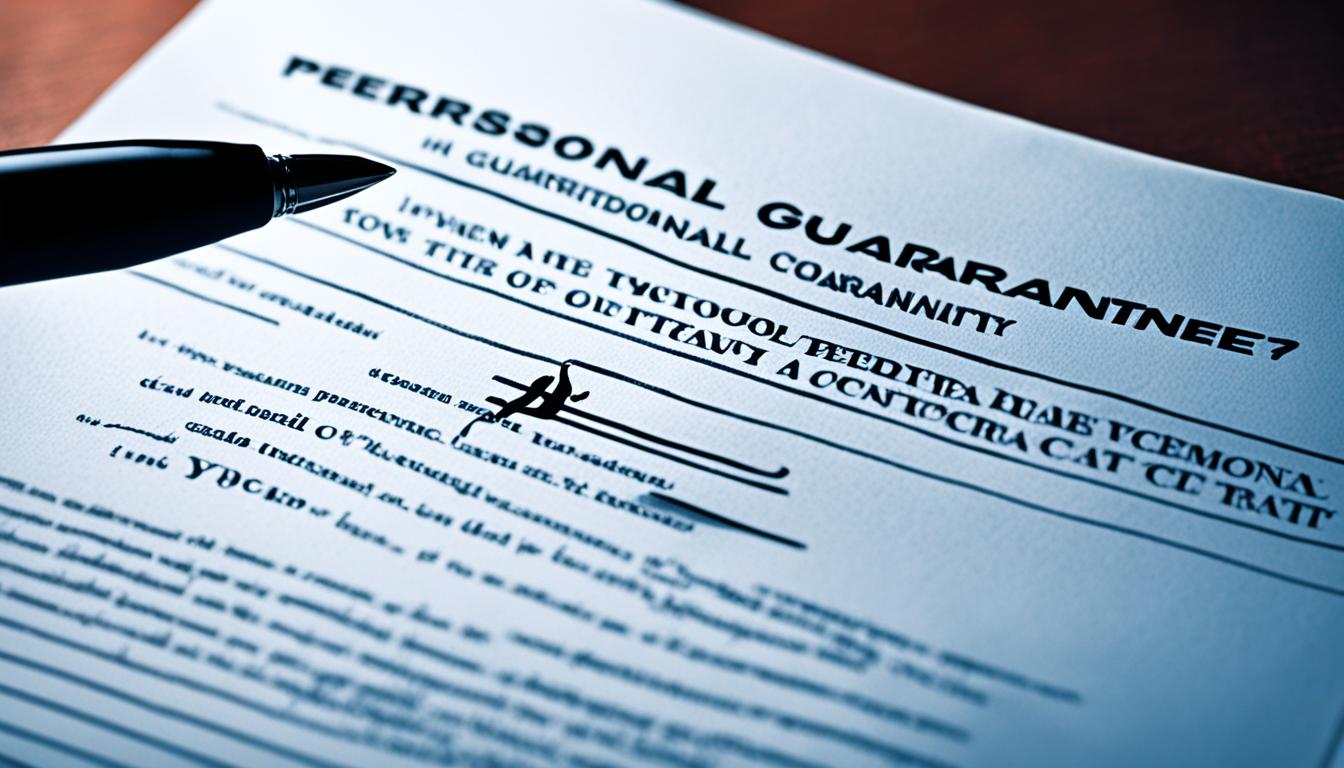Are you considering a business loan but unsure about the personal guarantee requirements? Understanding personal guarantees and your obligations as a borrower is essential before taking on a business loan. In this article, we’ll explore what personal guarantees are, how they work, whether all business loans require them, and important factors to consider before signing a personal guarantee.
Key Takeaways:
- Personal guarantees are legally binding agreements that hold the borrower personally liable for a business loan.
- Personal guarantees may be required by lenders to mitigate risk and increase loan approval chances.
- Not all business loans require a personal guarantee, but alternatives may come with different terms and conditions.
- Deciding whether to sign a personal guarantee requires careful consideration of risks and potential consequences.
- The Economic Development Collaborative offers resources and guidance for navigating business loans and understanding personal guarantees.
How Do Personal Guarantees Work on Business Loans?
When a business applies for a loan, the lender may require a personal guarantee from the borrower. This ensures that the guarantor of the personal guarantee is personally liable for the loan if the business defaults. Personal guarantees can come in different types, including unlimited guarantees, limited guarantees, several guarantors, and joint and several liability.
It’s important for borrowers to understand the terms included in a personal guarantee, such as:
- Loan repayment
- Interest and fees
- Collateral
- The legal implications of defaulting on the guarantee
By familiarizing themselves with these terms, borrowers can make informed decisions and mitigate risks associated with personal guarantees. Understanding the specific requirements of a business loan with a personal guarantee is crucial in navigating the loan process effectively.
Note: The image above illustrates the concept of a business loan with a personal guarantee, visually representing the symbiotic relationship between personal liability and business financing.
Do All Business Loans Require a Personal Guarantee?
When it comes to business loans, it’s a common misconception that a personal guarantee is always mandatory. While certain types of loans, like term loans and lines of credit, often require a personal guarantee, there are financing options available where a personal guarantee may not be necessary.
Loans secured by business assets, such as equipment loans, or financing options like invoice financing and business credit cards, are examples of loans that typically do not require a personal guarantee. These types of loans are often backed by collateral or may have higher interest rates to mitigate the absence of a personal guarantee.
While a personal guarantee can provide additional security for lenders and increase the likelihood of loan approval, it’s important for borrowers to explore alternative business credit options and consider the risks associated with personal guarantees. By understanding the different types of loans available and the corresponding requirements, entrepreneurs can make informed decisions that align with their financial goals and preferences.
Exploring Loan Types without Personal Guarantees
- Business loans secured by collateral: These loans are backed by specified business assets, such as equipment or real estate, reducing the need for a personal guarantee.
- Invoice financing: This type of financing allows businesses to use their outstanding invoices as collateral, bypassing the need for a personal guarantee.
- Business credit cards: Some credit card providers offer business credit cards that don’t require a personal guarantee. These cards typically come with higher interest rates.
- Equipment loans: Loans specifically designed to finance the purchase of equipment often do not require a personal guarantee, as the equipment itself serves as collateral.
It’s important to note that the absence of a personal guarantee does not eliminate the responsibility to repay the loan. Defaulting on a loan without a personal guarantee can still have negative consequences for a business’s credit history and financial standing. Borrowers should carefully consider their options, evaluate the terms and conditions of each loan, and assess the risks before making a decision.

By understanding the various loan options available and the corresponding requirements for personal guarantees, entrepreneurs can navigate the world of business financing more effectively. Nevertheless, it’s crucial to seek professional advice and carefully evaluate the risks and benefits of each loan before proceeding.
Should I Sign a Personal Guarantee?
The decision to sign a personal guarantee should be carefully considered. It’s important to assess the risks to personal assets and financial stability if the business defaults on the loan. Before signing, borrowers should negotiate the terms of the guarantee, seek legal counsel, and explore alternative business credit options that may not require a personal guarantee. It’s also crucial to thoroughly understand the terms, risks, and potential consequences of the personal guarantee before making a decision.
Signing a personal guarantee means taking on personal liability for the business loan. This means that in the event of loan default, the guarantor (usually the business owner) is responsible for repaying the loan using personal assets, such as savings, property, or investments. This can have a significant impact on personal finances and credit score.
“Signing a personal guarantee is a major commitment that should not be taken lightly. Borrowers must weigh the potential benefits of loan approval against the potential risks to personal finances and assets.”
When considering signing a personal guarantee, it’s essential to thoroughly review the terms and conditions of the guarantee, including the repayment schedule, interest rates, fees, and any collateral required. Understanding the potential consequences of defaulting on the loan is crucial. It’s advisable to consult with legal professionals who specialize in business and contract law to fully understand the legal implications of signing a personal guarantee.
“Taking the time to assess your personal financial situation, seek legal advice, and explore alternative financing options can help you make an informed decision about signing a personal guarantee.”
Although signing a personal guarantee may be necessary for some borrowers to secure business financing, it’s important to explore other options that may not require a personal guarantee. This could include applying for loans secured by business assets, exploring invoice financing, considering equipment loans, or utilizing business credit cards. By diversifying your financing sources, you can reduce your personal liability and potentially mitigate risks associated with personal guarantees.
Ultimately, the decision to sign a personal guarantee depends on the specifics of your business and personal financial situation. Careful consideration, professional guidance, and understanding the terms and risks can help you make the best decision for your business.
Navigating Business Loans: Understanding Personal Guarantees and Financial Responsibilities
When it comes to business loans, understanding personal guarantees and your financial responsibilities is essential. The Economic Development Collaborative (EDC) offers valuable insights and assistance to small businesses in navigating the complexities of personal guarantees and securing the right financing options.
The EDC emphasizes the importance of comprehending personal guarantees, why lenders require them, and the varying requirements among lenders. Through their expert guidance, they help borrowers make informed decisions about personal guarantees when applying for a business loan.
“Understanding personal guarantees is crucial for small business owners. It allows them to weigh the risks, protect personal assets, and make strategic decisions when seeking financing.”
– Economic Development Collaborative
Reasons Lenders Require Personal Guarantees
Lenders often require personal guarantees for business loans to mitigate the risk associated with lending to small businesses. Some common reasons include:
- To ensure that the borrower has a personal stake in the success of their business.
- To provide an additional layer of security for lenders in case of default.
- To leverage the guarantor’s personal assets and creditworthiness as collateral.
Requirements Across Lenders
It is important to note that personal guarantee requirements can vary among lenders. Each lender may have their own criteria and thresholds for determining the need for a personal guarantee. Some lenders may require personal guarantees for all business loans, while others may have specific thresholds based on loan amounts or business size.
Strategies for Personal Guarantee Avoidance
While personal guarantees are common, there are strategies that borrowers can consider for personal guarantee avoidance:
- Explore alternative financing options that do not require personal guarantees, such as secured loans or grants.
- Strengthen your business credit profile by building a strong credit history and maintaining good financial standing.
- Offer collateral or assets as security to reduce the need for a personal guarantee.
By understanding personal guarantees, the reasons lenders require them, and exploring strategies for personal guarantee avoidance, small business owners can navigate the world of business loans with confidence. The EDC’s expertise and resources serve as valuable tools in ensuring the best financial outcomes for their businesses.
| Lender | Personal Guarantee Required |
|---|---|
| Bank A | Yes |
| Bank B | Yes |
| Bank C | No (for loans below $50,000) |
| Bank D | No (for established businesses with strong credit history) |
Keep in mind that the specific requirements can vary further based on factors such as the borrower’s creditworthiness, loan amount, and industry. It is crucial to consult with lenders and financial advisors to understand the requirements applicable to your specific situation.

Conclusion
Personal guarantees are an important aspect of securing business loans, providing lenders with additional assurance while offering borrowers access to much-needed capital. However, it is crucial for borrowers to fully comprehend the implications of signing a personal guarantee.
Defaulting on a personal guarantee can have severe consequences for personal finances and credit scores. It is essential to carefully review and understand the terms and conditions of the guarantee before making a commitment. Seeking legal counsel and exploring alternative business credit options that do not require a personal guarantee are viable strategies to consider.
By making informed decisions, borrowers can navigate the complexities of personal guarantees in business loans. Understanding the risks involved and exploring all available options is key to securing the right financing solution without compromising personal financial stability.




No comments! Be the first commenter?